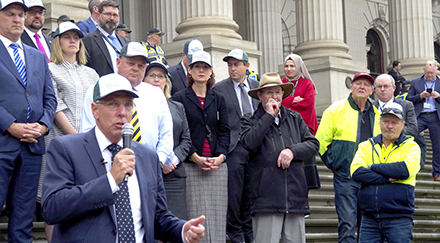The Victorian Government’s broad-ranging review of the Code of Practice for Timber Production to safeguard the Victorian Forestry Plan has been widely but cautiously welcomed by the timber industry and the CFMMEU. Source: Timberbiz
However, the State Opposition has described it as another nail in the coffin for local jobs and industry confidence. The 30-year plan sets out a long-term and sustainable future for Victoria’s forestry industry.
The Code of Practice for Timber Production 2014 is a key instrument containing important rules that govern timber harvesting and was introduced by the previous Liberal-National Government.
While the Code has been in operation there have been numerous legal challenges and uncertainty for conservationists and the forestry industry about their operating environment.
Shadow Minister for Agriculture Peter Walsh said the Government’s review would do nothing to protect jobs.
“The Andrews Labor Government continues to put Victoria’s responsible, sustainable native timber industry through the woodchipper,” Mr Walsh said.
“Daniel Andrews’ destructive policy agenda has put people out of work, but all we get from Labor is more reviews, more spin and nothing to guarantee local jobs.
“The only jobs this review is going to support are those of the Government bureaucrats who carry it out,’’ he said.
VicForests CEO Monique Dawson said that the review recognised that recent legal challenges put the future of the government’s forestry policy at risk, by potentially limiting the ability of VicForests to deliver on the supply commitments set out in it.
“To this end, a clear, accurate and enforceable Code is now needed to help protect jobs in our industry, many of which have been impacted by the bushfires and COVID-19,” Ms Dawson said.
She said that as a result, the review of the Code would help to:
- minimise the risk to short-term supply obligations arising from third-party litigation;
- ensure it remains fit for purpose and facilitates the implementation of the Victorian Forestry Plan; and
- identify regulatory reforms informed by the 2019-20 bushfires.
“This work will also help inform the upcoming comprehensive review of the Code required under Victoria’s Regional Forest Agreements (RFAs),’’ she said.
“The announcement is pleasing news for VicForests and we look forward to working with all stakeholders to help support and maintain a thriving responsible timber harvesting industry in Victoria.’’
The Australian Forest Products Association has cautiously welcomed the review to address the “relentless tide of vexatious litigation waged by anti-forestry groups’’.
AFPA CEO Mr Ross Hampton said the Victorian Government must act urgently to address the uncertainty created by last month’s Federal Court decision against VicForests.
“While VicForests has confirmed it will appeal the judgment, the court case has highlighted the need to reaffirm the intent of the regulatory framework and to avoid the endless lawfare that anti-forestry activist groups have waged in recent years to disrupt lawful timber harvesting operations,” Mr Hampton said.
“We urge the Victorian Government to progress the necessary changes to the Code and to work with the Federal Government on providing certainty to the RFA framework and for Victorian timber industry workers.”
However, Mr Hampton condemned Premier Daniel Andrews for persisting with his flawed plan to shut down the Victorian hardwood timber industry.
“If the Victorian Government is serious about protecting timber jobs in Victoria then it would abandon its disastrous plan to shut down the industry by 2030,” Mr Hampton said.
“Now, more than ever, Australia needs to support local manufacturing jobs. Victoria’s native timber industry supports thousands of regional jobs and is the backbone of many regional communities. As Victoria faces years of record unemployment it beggars belief that Premier Daniel Andrews is willingly putting thousands of people out of work,“ Mr Hampton said.
The Victorian Association of Forest Industries has welcomed the intent to provide greater certainty for industry.
“There are elements of the Code that are often open to broad interpretation, which has led to this review.” said VAFI CEO Tim Johnston. “As such, VAFI agrees with the Government’s intent to review The Code to limit risks from future litigation.”
Mr Johnston said that any review of The Code should lead to greater operational certainty and protection from harassment for forestry operators.
“However, VAFI continues its strong opposition to the Andrews’ government policy of phasing out the native hardwood industry. We will need to see further detail on the review to be assured that it will not create even further limitations on native forest harvesting,” Mr Johnston said.






